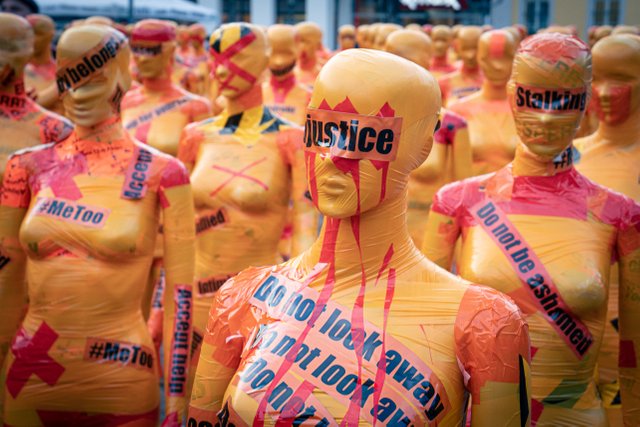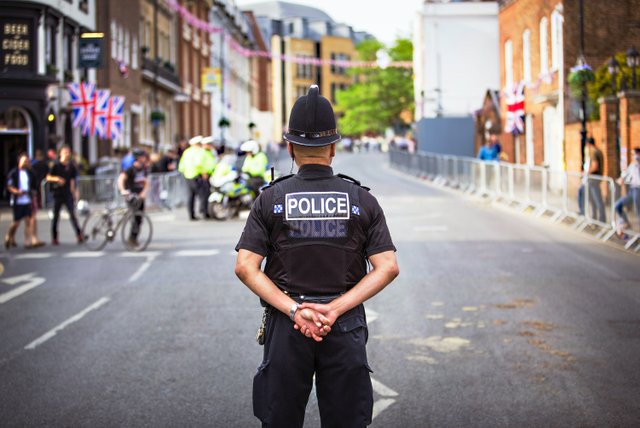
Most people in the UK might live under the impression that England has, compared to other countries, a good justice system.
Understandably, considering the fact that we mostly hear about solved crimes and successful convictions — which organisation wants to make headlines with their shortcomings. Unless you are a victim yourself, you probably have no idea how traumatising the justice system is for victims.
When we talk about the justice system, we do not mean the court on its own.
The traumatising process begins already shortly after the crime has occurred -when the victims want to report it to the police.
After a crime has occurred, victims need to be able to report the crime in a way that will make them feel safe.
It is hard enough for victims, especially victims of sexual crimes or domestic violence, to speak about what has happened. It is even more challenging for victims to report a crime when they fear to be not believed or treated with disrespect. To meet the victim’s needs starts with the first contact in the police station. Nevertheless, victims who do call police enter a system that is not designed to meet their needs. It is shocking to hear that many police officers still think that around 50% of reported rape cases are false complaints (Bows,2018), which is incredible, considering that the numbers speak a different truth. The Crown Prosecution Service examined rape allegations which happened between January 2011 and May 2012. The report ‘Charging Perverting the Course of Justice and Wasting Police Time in Cases Involving Allegedly False Rape and Domestic Violence Allegations’ showed that 5,651 allegations resulted in prosecutions for rape and only 35 for making a false allegation of rape. 1)
Yes, there is a small percentage of people out there, who are willing to make a false accusation — to satisfy their need for revenge, because they are vindictive or because of various other reasons in their personal life. Nevertheless, the most important fact is that, luckily, these people are a small minority.
From a woman’s point of view, it is difficult to understand why someone would put themselves through an investigation process which violates every aspect of your privacy only to get revenge.
When a victim contacts the police to report a crime, the first contact is vital, as cases could be mislabeled or closed without investigation based on the responding officer’s perspective of the situation.
We all remember the shocking failures of the police when women reported being sexually assaulted by the black cab driver John Worboys.
Despite his initial arrest in 2007, he was later released without charge after officers believed his version of events. The police never searched his home or cab. One of the first victims reported to police that the cabbie persuaded her to drink and forced a pill into her mouth. She woke up without a memory, with several bruises and amissing tampon. The police officers downplayed her injuries- she must have been drunk and fallen over.
The police officer decided to believe the cab driver and wrote in their report that it would seem unlikely that a cab driver would have alcohol in his vehicle, not to mention other types of drug substances.
In this case, the police assumed that black cab drivers are traditionally very professional people with a high ethical standard.
It was easier to blame the women. Which police officer did not have their own experiences with drunk people on a late Saturday night. The police officers gave the empathy to the poor cab driver, who, not only had to bring those drunk ladies home, working all night — and now gets falsely accused.
In the case of another victim, the police did not photograph her injuries, officers did not take witness statements, and her papers were lost in the end.
It took the police two more years to finally recognise a pattern, believe victims, and arrest John Worboys.
Years, in which he molested more innocent women.
By the time he was finally prosecuted in 2009, he had assaulted over 100 women.
The suspiciousness of the victim’s credibility often starts with the interaction between the police officer and the victim. A highly traumatised victim’s assessment is often not straightforward. Everyone involved, even just in a small car accident, will remember how confused a person can be after a traumatic event. It takes us a while to be able to process what has happened.
Memories can resurface at different times, sometimes days or weeks after the incident happened. We suddenly remember that the traffic light showed orange and not green or drove past the older man walking his dog.
Furthermore, the victim might not be able to recall or verbalise what has happened in a way that it makes sense. The description of the event might be puzzled or described in single sequences which are not in order.
All of these problems are entirely normal.
When I worked years ago as a paramedic, I often had to deal with people after car accidents. Usually, my patients were not physically injured, and the cars’ damage was not that significant. Nevertheless, the shock of what has happened was huge. Most people could not tell me how the accident occurred in calm, logically way. I had to ask encouraging questions, going back and forth through the conversation and had to be prepared to change my notes on the medical report at least twice.
However, I would have never questioned my patient’s credibility.
On the other hand, the combination of improperly trained investigators and fragile, the traumatised victim can create a cycle, leading to an increasingly judgmental detective and a withdrawing victim.
Victims are frightened and in a very vulnerable state of mind. A police officer who does not believe them or does not treat the victim respectfully will make the victim withdrawing instead of cooperating. When the victim more and more withdraws, the police officer thinks his suspicion is confirmed and starts pushing the victim even further away.
The error at the beginning of the investigation has a significant impact on the rest of the justice process.
The CPS charged, prosecuted and convicted fewer cases despite more alleged rapes recorded by police in the year to March 2019. This data shows that charged cases decreased by 38 per cent; prosecutions declined by 33 per cent; and 27 per cent fewer convictions (2).
Overall, these numbers show that out of 100 rape cases recorded by the police, only three ended with a conviction. (Crown Prosecution Service, 2019)
The Crown Prosecution Service explains the increasing gap between reported cases and cases taken to court by referring to the police. The police are forwarding fewer claims, and lack to respond if further information is needed.
Imagine being a victim of a traumatic crime, and your perpetrator will walk away freely because a police officer did not forward the vital information.
Some police investigation methods can also make the victim feel more like a suspect instead of being recognised as a victim. In today’s society, mobile phones are for a lot of people like a lifeline. It is far more than a calendar; it connects us to people, is our diary, manages our finances, etc. To ask victims to give up their mobile phones, including all their data and access to social media accounts, without knowing when they will get it back is more than just inconvenient.
Victims of sexual assault already experienced a complete loss of privacy and control over their lives. Through harsh investigation methods, the victim is re-traumatised and experiencing an even more significant loss of power and privacy.
Baroness Chakrabarti labelled methods like this in a recent Sky interview as “huge indignity and massive inconvenience” and states further that she believes it contributes to putting people off reporting rape (3).
When cases are referred to the court, and victims have to wait a long time for the trial to start, the current justice system fails victims once more.
After a traumatic event, victims need to be able to seek help and process what has happened to them. The organisation ‘End violence against women’ conducted an online YouGov in 2018. The survey states that people viewed access to counselling more critical than access to police and courts process for survivors of rape(4). Furthermore, 60% of people believed that access to free counselling would be available for rape survivors.
Sadly, this is not the case. According to EVAW, there were 6,355 survivors on Rape Crisis waiting lists in march 2018 (5)
The current system not only fails to provide the much needed and wanted help for victims; it even puts people off to seek help in the first place.
If a victim is undertaking pre-trial therapy, it must be disclosed to the court. This could lead to the defence accessing notes from the therapy sessions, which could be used against the victim (6). The fundament of every therapy is to provide the patient with a safe, respectful environment where they can speak about the otherwise unspeakable. We take this safe space, a shoulder to lean on, a place to heal, away from victims.

Photo by King's Church International
It can take months until the trial begins. In these months, the world doesn’t stop- life goes on with all its’ responsibilities.
The ONS report (2017) of Sexual offences in England and Wales showed that 45% of female victims of rape or assault the perpetrator was a partner or ex-partner. Strangers committed only 15% (7).
Another study carried out by the Ministry of Justice (2013) ‘An Overview of Sexual Offending in England And Wales’ showed that in one-third of female victims of sexual assault the reported offender was someone close to them, including a work colleague or friend (8)
Victims need to go out and function in a frightening world. As the studies show, many victims experienced crime in an environment that was previously perceived as safe. After the incident, victims need to learn to cope with not feeling safe or even leaving home where the crime occurred. Therapy can help the victim to face these daily challenges in the critical time after the incident happened.
Therapy can not help victims when they need to fear that their confidential, most private thought and feelings are shared with their offender and the defence lawyer.
Already vulnerable victims who appear in court to testify face another traumatising situation. As pointed out through the previously listed studies, most predators in sexual assault cases are not an unknown stranger. Nevertheless, research in the last 30 years draws attention to the fact that the preassumption of the stereotypical rape is still a leading expectation among the police, court and the judges. Scenarios which do not comply with the stereotype of the unknown stranger, raping an innocent woman on her way home late at night, are often not accepted as a real rape case (Bows,2018 ).
As attrition research found, much of the victim’s credibility is linked to the victim’s personality and character (Bows,2018). Courts disregarded victims based on their characters or behaviours such as alcohol consumption (Bows,2018)
A rather ironic method, considering that an offender can excuse his behaviour because he was under the influence of alcohol and therefore not fully in control over his actions.
A victim, on the other hand, can not use alcohol consumption to emphasise being even more vulnerable and unable to defend themselves.
A victim who appears in court to testify has not only to face the predator. A victim is an object of observation not only for the defendant but also for the jury. The pressure of recalling a traumatic even, facing the person who caused it and the stress of being analysed from all sides is intense for victims.
Everyone responds to sexual violence differently.
Some might be upset or angry. Others talk to their friends, while some
are too embarrassed. There is no ‘right’ way of being a victim of sexual assault.
A study carried out by Jennifer Temkin and colleagues in 2017 showed that existing rape myths have still a significant influence on rape trials.
Jurors are likely to believe rape myths and, as research showed, when the victim and perpetrator knew each other, to blame the victim (Bows,2018).
This preconception is significantly damaging, considering how society’s social life has shifted during the last decades. Men and women interact more freely with each other, not conforming to traditional standards. It is hereby important to point out, that the definition of a stranger is rather vague. Spending an evening in a pub, chatting to different people- one of them who becomes later on the offender — is enough to disqualify the person from being a stranger. Does chatting to someone in a pub make them really more than a stranger?
Our digital age can blur the line between a stranger and a friend. We lack a proper definition of what is perceived as a stranger and what type of contact can define a person as ‘known’ to us.

Can we only say we ‘know’ someone when we met them in person? Does it count when we had 20 video calls a week? Can we define a person as a friend even though we only communicated with them online? Is it possible that we know someone with whom we chat every day, but have no idea about the colleague working in the IT department at the other end of our office?
As we hear in countless divorce statements- it seems as well possible that we live with someone for 20 years, have children and share our bed and table with them — and in the end, do not know the other person at all.
Often during a trial, the focus shifts away from the crime itself, towards the victims’ behaviour, in the present and the past. Even though it is usually not allowed to ask about past relationships — it is allowed to ask questions if it could be important for the case. Section 41 of the Youth Justice and Criminal Evidence Act 1999 (YJCEA 1999) places limits on the defence’s ability to examine a victim’s sexual history.
Nevertheless, the defence is allowed to question the victim about their history in certain circumstances :
If the defendant claims the victim consented to the act, questions are allowed to show that, based on previous consensual activities, he believed you were consenting to this sexual activity. When the defendant says you consented to the act, (not necessarily with him) at about the same time as the alleged assault, and when the defendant says you consented to another sexual behaviour which was similar to the act that he believed you were consenting to this sexual activity.
This method brings victims in a very uncomfortable situation and is more than unfair on the victim. Just because someone consented to a type of sexual activity in the past, it doesn’t mean the person consents every time.
We don’t have to imagine this logic only with sexual activities — we can apply the same argument in other social interactions. Just because we helped out a friend once and paid his bills, does not mean he can set up a direct debit with our bank account.
Furthermore, having had sex with a person in the past or being in a relationship with them does not mean consent is given to all sexual activities. Consent must be given every time people engage in sexual contact.
Section 74 SOA 2003 states that: “…a person consents if (s)he agrees by choice and has the freedom and capacity to make that choice.”
This means in general a person needs to have the freedom to choose whatever they like. On the other hand, it is vital that the victim has the capacity to make a choice for themselves. Being unconscious or under the influence of drugs or alcohol may remove a person’s capacity to consent.

Taking this definition into account, it would be even more important to prosecute offenders who committed a crime while the victim was under the influence of drugs or alcohol. In this case, the offender deliberately used the intoxicated state of his victim.
A Personal Victim Statement would give many victims the chance to represent the impact the crime had on their lives to the court. Victims would be able to make the jury aware of their physical injuries, psychological effects, as well as emotional and financial consequences.
Such a statement gives the victim the chance to make her needs heard and shift away from being only a witness to being an active participant in the process. The objectification of the victim would be reversed.
Dame Vera Baird, the Victims’ Commissioner for England and Wales, recently wrote an article for The Telegraph, stating that victims rights are still not enforced or monitored.
For example, she mentioned that the police gave only one in seven victims an opportunity to write a personal statement (9).
She furthermore explains that the government gave her role a title, office and a budget, but it missed to assign her authority and execute powers.
To fulfil her role as Victims Commissioner, it is vital to access reliable data to find shortcomings. Nevertheless, she lacks the powers to compel agencies to provide information. Even if her office finds failings in compliance, she has no power to enforce consequences or changes. (10)
We need to improve the criminal justice systems response to victims urgently.
Our criminal justice system is focused on prosecuting the potential criminal, without recognising the trial itself is a significant milestone for the victim’s recovery.
Survivors need to be able to access the support they need when they need it. Therefore, we must put pre-trial therapy strategies in place, accessible and free of charge for victims. It needs to be ensured that victims can talk in a safe space about the crime.
Councils need to be made aware that it can be impossible for a victim to continue to live inside the home where the crime took place. Victims need to able to get support from their local council to relocate.
As I outlined above, there is an urgent need for education and awareness campaigns to promote understanding of rape myths amongst criminal justice professionals, the police and the general public. Furthermore, we need specialists at all stages of the criminal justice process-people who monitor the cases and stay in contact with the victim.
Follow-ups with the victims to check on their wellbeing is particularly important in cases where ‘no further action’ is taken.
Statistically, 20% of women and 4% of men have experienced some type of sexual assault since the age of 16. The majority of victims (86%) do not report their experiences to the police.
Those numbers are horrific and need to be changed.
As a society, we should aim to support those vulnerable members with the support they want and desperately need.
Referencing:
-Bows, H. (2018) Victims and victimisation. Milton Keynes: Open University Press
- The report, Charging Perverting the Course of Justice and Wasting Police Time in Cases Involving Allegedly False Rape and Domestic Violence Allegations, can be found at: www.cps.gov.uk/sites/default/files/documents/publications/perverting_course_of_justice_march_2013.pdf
2)CPS. (2019). Violence Against Women and Girls report 2018–19. CPS, London.
CPS (2020). Rape and Serious Sexual Offences (RASSO) 2025. CPS, London.
https://news.sky.com/story/justice-system-is-failing-victims-of-rape-say-campaigners-11758166
https://www.endviolenceagainstwomen.org.uk/campaign/no-more-survivors-turned-away/
5)https://www.endviolenceagainstwomen.org.uk/campaign/no-more-survivors-turned-away/
6)https://rightsofwomen.org.uk/wp-content/uploads/2019/03/From-Report-to-Court-2018.pdf
ONS (2017) Sexual offences in England and Wales: year ending March 2017. Available at: www.ons.gov.uk/peoplepopulationandcommunity/crimeandjustice/articles/ sexualoffencesinenglandandwales/yearendingmarch2017
Ministry of Justice (2013) An Overview of Sexual Offending in England And Wales. Available at: www.gov.uk/government/statistics/an-overview-of-sexual-offending-in-england-and-wales
9)https://www.telegraph.co.uk/news/2020/12/03/justice-system-failing-victims-crime/
10)https://www.telegraph.co.uk/news/2020/12/03/justice-system-failing-victims-crime/